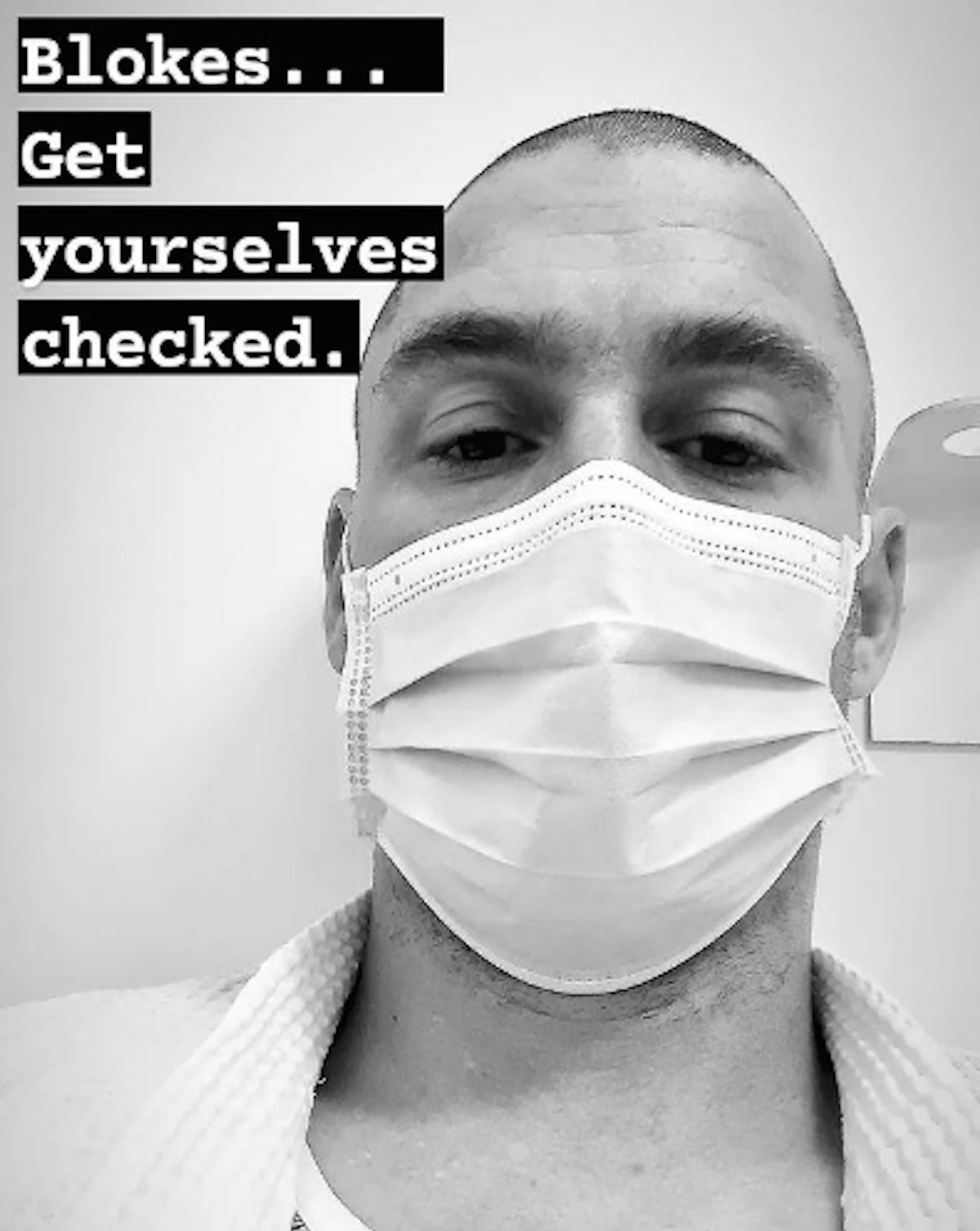Penile Cancer & Helping Men Overcame Shame
- Joe Merrall, a 39-year-old personal trainer from Auckland, New Zealand, decided to see a doctor after noticing a tiny bump on his penis, something he initially dismissed as skin irritation from the pants he was wearing.
- Merrall was diagnosed with penile cancer, and the type of it was squamous cell carcinoma, a common form of skin cancer. He has already undergone surgery to remove the tumor and a 5mm margin. Next, he will have a CT scan to check if the cancer has spread.
- Penile cancer is cancer that starts in the penis, which is the external male sex organ, and it's rare, especially among men in North America and Europe.
- This year, about 2,050 new cases of penile cancer will be diagnosed in men in the U.S., and about 470 people will die from this type of cancer.
- The human papillomavirus (HPV), the most common sexually transmitted disease, has shown to be linked to a number of cancers including oral, anal and penile cancers.
His diagnosis, which came after Merrall noticed an unusual lump on his penis, has inspired him to share his story and urge others to get checked, insisting “better safe than sorry.”
Read More
According to Stuff, a New Zealand media company, Merrall underwent a biopsy and learned of his cancer diagnosis on December 23, something he didn’t immediately tell his family as he felt ashamed.
Merrall, who dubs himself on social media as “just an average Kiwi bloke helping average Kiwi blokes become better than average, underwent surgery weeks later at North Shore Hospital in Auckland.
He had a tumor removed and a 5mm margin, and now he is awaiting a CT scan to check whether the cancer has spread.

“I experienced every emotion known to man when I got the diagnosis,” Merrall explained. “I bottled it all up, I didn’t even want to go to the gym, I just thought ‘what’s the point?'”
Merrall continued, “The surgery was 90 minutes, in total they took more than a third of my penis. It looks weird the way they’ve sewn it up. My [urine] flow is all over the show. I’m still adjusting but they may well tidy it up at some stage. I’ll be able to have sex again, but it’s still quite tender.”
He wrote in an Instagram post on the day of his January 18 surgery, “Today I have surgery to remove a tumor from my [penis]. They will remove it as well as surrounding tissue to insure there is no cancer left. This will significantly change the way it looks and this has really impacted my mental health.”
The gym enthusiast admitted he struggled at first with the “reality” of his diagnosis and feeling “less of a man,” but he pushed through with a positive attitude so he could “get busy living.”
“I would say to people to check yourself, know your normal and anything not normal go to the doctor about it and get yourself checked. Better safe than sorry,” Merrall, who was diagnosed with a squamous cell carcinoma type of penile cancer, added.
What Is Penile Cancer?
Penile cancer is cancer that starts in the penis, which is the external male sex organ, and it's rare, especially among men in North America and Europe. And just like Merrall’s case, one of the first signs of penile cancer is typically a change in the skin of the penis.
According to the American Cancer Society, penile cancer is diagnosed in fewer than 1 man in 100,000 each year and accounts for fewer than 1% of cancers in men in the United States. ACS reports that this type of cancer is "much more common" among men in some parts of Asia, Africa and South America.
RELATED: Professional Clown Has Penis Amputated After Being Diagnosed With Penile Cancer
This year, about 2,050 new cases of penile cancer will be diagnosed in men in the U.S., and about 470 people will die from this type of cancer.
Signs & Symptoms
According to ACS, some other symptoms of this cancer include:
- An area of skin becoming thicker
- Changes in the skin color
- A lump
- An ulcer (sore) that might bleed
- A reddish, velvety rash under the foreskin
- Small, crusty bumps
- Flat, bluish-brown growths
- Smelly discharge (fluid) or bleeding under the foreskin
- Swelling
- Lumps under the skin in the groin area
Types of Penile Cancer
As previously mentioned, most times, the first sign of penile cancer is a change in the skin. And that's because almost all penile cancers start in skin cells of the organ.
However, each type of tissue (skin) in the penis contains different types of cells. And different types of penile cancer can start from these cells.
HPV Can Cause Anal, Oral, and Penile Cancers
The differences between the types of penile cancer are important because they "determine the seriousness of the cancer and the type of treatment needed," according to ACS.
Here are the types of penile cancer:
- Squamous cell carcinoma (the type of penile cancer Merrall was diagnosed with): About 95% of penile cancers start in flat skin cells called squamous cells.
- Verrucous carcinoma: This type of cancer growing on the penis is also known as Buschke-Lowenstein tumor. It's an "uncommon form" of squamous cell cancer that can start in the skin in many areas.
- Carcinoma in situ (CIS): This is the earliest stage of squamous cell cancer of the penis.
- Melanoma: The deadliest form of skin cancer; melanoma starts in melanocytes.
- Basal cell carcinoma: This is another type of skin cancer that can develop on the penis.
- Adenocarcinoma (Paget disease of the penis): This very rare type of penile cancer can develop from sweat glands in the skin of the penis.
- Sarcoma: A small number of penile cancers are sarcomas. These cancers develop from blood vessels, smooth muscle or other connective tissue cells of the penis.
HPV & The Link to Penile Cancer
The human papillomavirus (HPV), the most common sexually transmitted disease, has been shown to be linked to a number of cancers including oral, anal, and penile cancers.
About 80% of people who are sexually active end up infected with HPV at some point in their lives. Most of the time, the body's immune system naturally clears the HPV on its own and the person never experiences health problems or symptoms. But in some cases, if someone has contracted one of the "high-risk" strains of HPV, the infection might linger over a long period of time, ultimately damaging cell DNA and resulting in cancer-causing mutations.
RELATED: What is HPV? And Does it Cause Cancer?
According to research, HPV is responsible for 34,800 cases of cancer in the U.S. each year90 percent of which could be prevented with the HPV vaccine. First introduced in 2006 under its brand name Gardasil, this vaccine is extremely effective in preventing certain cancers.
Anal cancer survivor Justine Almada on why she advocates for HPV awareness
Men Dismiss Symptoms Too Often
When something in your body feels off, it never hurts to talk to a doctor about it. However, this is often easier said than done. Unlike women, who will report symptoms to their doctor but sometimes be brushed off, men sometimes ignore a doctor visit as long as possible.
This was the case for testicular cancer survivor Todd Rosenbluth, who was one of those guys who avoided the doctor at all costs. He led a healthy lifestyle, so he reasoned with himself that a routine check-up wasn't really necessary. It was Rosenbluth's wife who pushed him to schedule a visit, and it ended up being be the best decision he could have made. Now, he's an advocate for early detection.
"My wife definitely saved my life," Rosenbluth previously told SurvivorNet. "Luckily when I caught the testicular cancer it was so early that I'm totally fine to this day, and it's because of her. Testicular cancer is 99% curable if it's caught early enough. The only way to catch it is self exam or go to the doctor. If you're worried don't be ashamed, guys. Go to the doctor.”
Dealing With Shame
"Shame is an important topic when it comes to cancer," Tripp Hornick, a testicular cancer survivor who was diagnosed when he was just a 21-year-old college student, previously told SurvivorNet. "I think we as men have an awful lot that we can learn from what women have to go through with breast cancer."
Tripp emerged from his experience with an extremely positive message: Do not be a victim. "What you accomplish is what cures any shame," Tripp says, and there's no reason you can't go on to live a happy and fulfilling life.
Coping With The Shame That May Come With Testicular Cancer
Contributing: SurvivorNet Staff
Learn more about SurvivorNet's rigorous medical review process.

